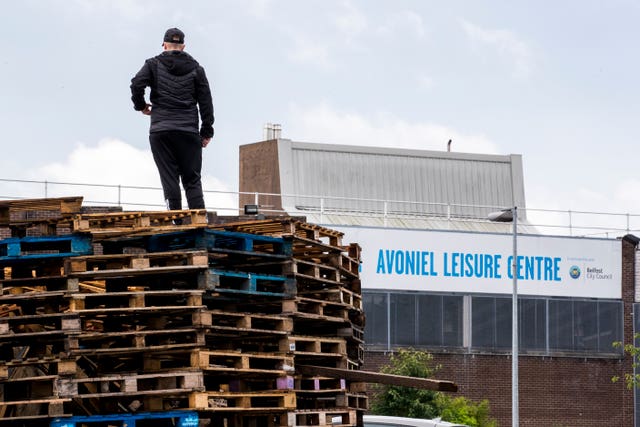
Loyalist community leaders have appealed for calm after a council decision to remove a bonfire in a Belfast leisure centre car park.
Avoniel closed its doors early on Tuesday afternoon, shortly after loyalists called for supporters to gather at the site for a rally to protest against the planned intervention.
Presbyterian minister Mervyn Gibson told a large crowd the pyre was only 21 feet high and no longer dangerous since all the tyres had been removed.
Avoniel bonfire is 21 feet high, with no tyres, no threat to any building – it meets the Fire Service guidelines – it is no longer a dangerous bonfire – what excuse are are Councillers now using to remove wood?
— Mervyn Gibson (@mervgib) July 9, 2019
Johnny Wright, 60, a resident from Avoniel, said: “These ones on the council, it is excuse after excuse; they just want to rip our culture apart and there is no call for it.”
Earlier on Tuesday, Belfast city councillors reaffirmed the decision to send contractors, under police escort, to take down the bonfire.
A council committee had reconvened to reassess the situation following a move by the bonfire builders on Monday evening to remove hundreds of tyres from the bonfire.
The decision remained unchanged, with a council spokeswoman saying the authority was acting in the interests of protecting life and property.
Unionist parties in the council, in the minority on the committee, expressed disappointment at the decision.

On Tuesday evening, a handful of young people gathered on top of the pile of pallets holding an Ulster flag.
Others formed a line at its base with arms interlocked. The demonstration ended with a round of applause.
There was a low-key police presence a few streets away, and Mr Gibson said too many local young people had been imprisoned since the 1998 Good Friday peace agreement.
He said: “I don’t believe one Sinn Fein or Alliance councillor is worth doing that for, so I would appeal for calm at this bonfire.
“Do not react, I know that is going to be difficult because there is anger here, I am angry about the decision, but I would appeal that we do not react when they decide to move in, if they do decide to move in.”
The demonstration was told a nationalist-dominated council was attempting to demonise loyalism.
Mr Gibson said: “No matter what this community did it was not enough to appease those who oppose us.”
He said the bonfire builders did the right thing and removed the tyres.
He added: “Let the council at this late stage still do the right thing and call off their plans to remove the wood at this bonfire.”
Mr Wright said the pyre had been constructed here in July for years.
He said: “It has never caused any trouble, or caused any harm or destruction, the ground can be repaired.
“The tyres should not have been on it.”
He added: “Leave us alone, we don’t do any harm, once a year this happens, for what, for one night? And they want it stopped.”
Avoniel Leisure Centre has closed early today. We apologise for any inconvenience to @Better_NI users. All members of Avoniel can use any of our other 13 centres across Belfast in the meantime – https://t.co/o6fGL35CfY
— Belfast City Council (@belfastcc) July 9, 2019
Huge bonfires will be lit in loyalist areas across Northern Ireland late on Thursday night to usher in the Twelfth of July, the main date in the Protestant loyal order marching season marking the 1690 Battle of the Boyne.
While most of the fires are lit without major incident, a number continue to prove contentious, with the authorities having taken action in recent years on towering structures deemed unsafe and posing a threat to nearby properties.
The gates of the Avoniel centre were barricaded on Sunday in a pre-emptive bid to prevent police and contractors accessing the site, forcing the centre to close early for the day.
On Tuesday afternoon, the gates were again barricaded. Industrial bins and tyres were placed in front and behind them and a secondary barricade – made up of tyres – has been built further into the car park entrance.
Earlier, a delegation representing the bonfire builders met police at a city centre station to urge them not to intervene to support the removal of the bonfire.
They insisted taking away the tyres has rendered the bonfire safe and warned its demolition would be unjustified and could lead to community tension spilling over.
Outside Musgrave Street police station on Tuesday morning, Robert Girvin, a representative of the bonfire builders from the East Belfast Cultural Collective, urged councillors to hold direct talks with loyalists.


Comments: Our rules
We want our comments to be a lively and valuable part of our community - a place where readers can debate and engage with the most important local issues. The ability to comment on our stories is a privilege, not a right, however, and that privilege may be withdrawn if it is abused or misused.
Please report any comments that break our rules.
Read the rules here